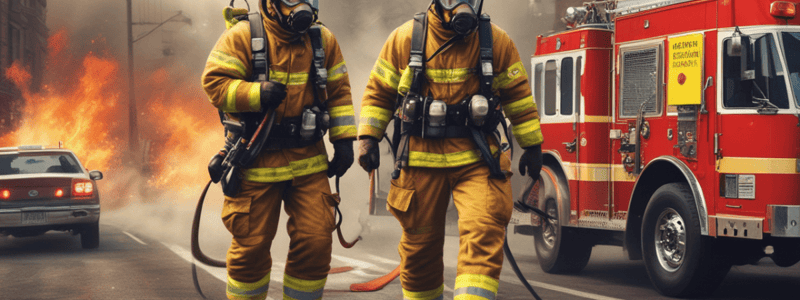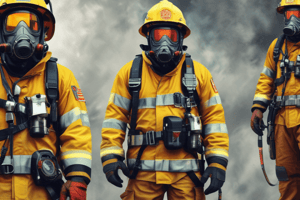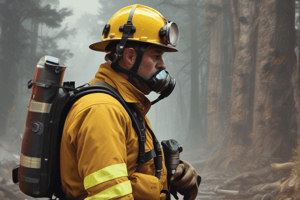Podcast
Questions and Answers
What is the primary goal of counseling, peer support teams, and employee assistance programs for fire fighters?
What is the primary goal of counseling, peer support teams, and employee assistance programs for fire fighters?
- To prevent emotional reactions from impacting work and life (correct)
- To provide immediate crisis response
- To promote physical health and wellness
- To provide ongoing training and education
What is the primary difference between CISM teams and peer support teams?
What is the primary difference between CISM teams and peer support teams?
- CISM teams focus on emotional health, while peer support teams focus on physical health
- CISM teams respond immediately, while peer support teams provide ongoing support (correct)
- CISM teams are for fire fighters, while peer support teams are for EMS personnel
- CISM teams provide ongoing support, while peer support teams respond immediately
What is the purpose of a critical incident stress debriefing (CISD)?
What is the purpose of a critical incident stress debriefing (CISD)?
- To evaluate the effectiveness of crisis response protocols
- To provide training on crisis response
- To discuss the emotional impact of a traumatic call (correct)
- To promote team-building and camaraderie
Why is maintaining good emotional health important for fire fighters?
Why is maintaining good emotional health important for fire fighters?
What is the focus of employee assistance programs for fire fighters?
What is the focus of employee assistance programs for fire fighters?
When is a critical incident stress debriefing (CISD) typically held?
When is a critical incident stress debriefing (CISD) typically held?
What is the purpose of peer support teams for fire fighters?
What is the purpose of peer support teams for fire fighters?
What is the primary benefit of counseling for fire fighters?
What is the primary benefit of counseling for fire fighters?
What is the role of critical incident stress management (CISM) programs?
What is the role of critical incident stress management (CISM) programs?
Why is it important for fire fighters to know about the resources available to them?
Why is it important for fire fighters to know about the resources available to them?
Which program is designed to provide a forum for discussing anxieties and emotions triggered by a traumatic event?
Which program is designed to provide a forum for discussing anxieties and emotions triggered by a traumatic event?
What is the primary benefit of having multiple resources available for firefighters?
What is the primary benefit of having multiple resources available for firefighters?
What is the primary distinction between CISM teams and peer support teams?
What is the primary distinction between CISM teams and peer support teams?
What is the ultimate goal of the resources available to firefighters?
What is the ultimate goal of the resources available to firefighters?
How do counseling, peer support teams, and employee assistance programs contribute to firefighter survival?
How do counseling, peer support teams, and employee assistance programs contribute to firefighter survival?
What is the primary focus of a CISD?
What is the primary focus of a CISD?
Why is it essential for firefighters to have access to multiple resources?
Why is it essential for firefighters to have access to multiple resources?
What is the primary advantage of having CISM teams and peer support teams?
What is the primary advantage of having CISM teams and peer support teams?
How do the resources available to firefighters contribute to their overall well-being?
How do the resources available to firefighters contribute to their overall well-being?
What is the underlying assumption of the resources available to firefighters?
What is the underlying assumption of the resources available to firefighters?
What is a common consequence of emotional reactions not being addressed in firefighters?
What is a common consequence of emotional reactions not being addressed in firefighters?
What is the primary objective of holding a critical incident stress debriefing (CISD) soon after a traumatic call?
What is the primary objective of holding a critical incident stress debriefing (CISD) soon after a traumatic call?
What is the main advantage of having multiple resources available to firefighters?
What is the main advantage of having multiple resources available to firefighters?
What is the primary distinction between the role of counseling and peer support teams?
What is the primary distinction between the role of counseling and peer support teams?
What is the ultimate goal of critical incident stress management (CISM) programs?
What is the ultimate goal of critical incident stress management (CISM) programs?
What is the primary benefit of providing a forum for firefighters to discuss their anxieties and emotions?
What is the primary benefit of providing a forum for firefighters to discuss their anxieties and emotions?
What is the main reason why maintaining good emotional health is crucial for firefighters?
What is the main reason why maintaining good emotional health is crucial for firefighters?
What is the primary difference between the timing of CISM teams and peer support teams?
What is the primary difference between the timing of CISM teams and peer support teams?
What is the primary role of employee assistance programs in supporting firefighters?
What is the primary role of employee assistance programs in supporting firefighters?
What is the primary benefit of having a range of resources available to firefighters?
What is the primary benefit of having a range of resources available to firefighters?
Flashcards are hidden until you start studying
Study Notes
Injury and Illness Prevention
- Firefighting is a dangerous profession, with many injuries and deaths occurring off the fire ground
- Fire fighters must be aware of risks associated with their job responsibilities and activities
- Every fire department must have a strong commitment to fire fighter health and safety, with fire fighters taking the lead for their own health and safety
- Safety measures must become routine, consistent, and fully integrated into every activity, procedure, and job description
Causes of Fire Fighter Deaths and Injuries
- 69 fire fighters were killed in the line of duty in 2016
- The largest share of deaths occurred from stress, overexertion, and medical issues (42%)
- Cardiac events accounted for 38% of these deaths
- Vehicle crashes were the second leading cause of death
- In 2016, 62,085 fire fighters were injured in the line of duty
Safety Measures
- Preparation for response begins long before the alarm is sounded
- Fire fighters must be physically and mentally ready
- Personal equipment must be checked, and apparatus must be ready
- Familiarity with response district, SOPs, and knowledge of nearby hydrant locations are essential
- Apparatus drivers must consider road and traffic conditions, route to the incident, and position at the incident scene
Fire Fighter Life Safety Initiatives
- 16 initiatives to reduce fire fighter deaths and injuries
- Examples include cultural change, accountability, risk management, empowerment, training and certification, and medical and physical fitness standards
Health and Safety Programs
- NFPA 1500 provides a template for implementing a comprehensive health and safety program
- Programs must include policies, training and education, apparatus operation, PPE, emergency operations, station safety, medical and physical requirements, and health and safety programs
- Government regulations, such as OSHA, also play a role in workplace safety and responder safety
Standard Operating Procedures (SOPs)
- Every fire department should have SOPs or standard operating guidelines (SOGs) that provide specific information on tasks
- Procedures enable fire fighters from different stations or companies to work together safely and smoothly
- The fire department chain of command enforces safety goals and procedures
Incident Command System (ICS)
- A nationally recognized plan to establish command and control of emergency incidents
- The ICS is flexible and can be used for any emergency situation
- It should be implemented at every emergency scene, from routine auto accidents to major disasters involving responders from numerous agencies### Importance of Hydration and Sleep
- Maintaining good hydration during firefighting activities reduces the chance of heart attacks
- Proper hydration is essential for peak physical performance and requires ongoing attention
- Good health requires adequate, uninterrupted sleep to maintain alertness, prevent stress, and avoid illnesses and injuries
- Establish a consistent sleep schedule and routine, and avoid electronic devices before bedtime
Heart Disease
- Heart disease is the leading cause of death in the United States and among firefighters
- A healthy lifestyle with a balanced diet, weight training, and cardiovascular exercise reduces risk factors for heart disease
- Regular physical examinations are crucial for early detection and prevention of heart disease
Cancer
- The increase in synthetic products has led to an increase in toxicity in modern fires, causing cancer in firefighters
- Carcinogens enter the body through ingestion, injection, respiratory system, or skin absorption
- Firefighters have a 9% higher risk of being diagnosed with cancer than the general population
- Contaminated objects and gear should be removed, washed, and decontaminated to prevent cancer-causing substances from spreading
Tobacco, Alcohol, and Illicit Drugs
- Tobacco use is a major risk factor for cardiovascular disease, reduces respiratory efficiency, and increases cancer risk
- Avoid tobacco products entirely for health and insurance reasons
- Excessive alcohol use damages the body, affects performance, and increases cancer risk
- Illicit drug use has no place in the fire service and can endanger lives
Counseling and Critical Incident Stress Management
- Firefighters experience high-stress situations and work in an environment with unscheduled and unexpected events
- High levels of stress can produce symptoms like sleep disturbance, irritability, overeating, and depression
- Identify and utilize resources like employee assistance programs, peer support teams, and critical incident stress management programs to maintain behavioral health
Firefighter Health and Safety
- Firefighting is inherently dangerous, and many firefighters are injured off the fire ground
- Every fire department must have a strong commitment to firefighter health and safety
- Safety measures should be routine, consistent, and fully integrated into every activity and procedure
Causes of Firefighter Deaths and Injuries
- In 2016, 69 firefighters died in the line of duty, with the largest share due to stress, overexertion, and medical issues
- Cardiac events accounted for 38% of these deaths
- The largest number of injuries occurred on the fire ground, with overexertion or strain being the leading cause### Fire Service Standards and Safety
- The National Fallen Firefighters Association developed the 16 Firefighter Life Safety Initiatives to prevent firefighter injuries and fatalities.
- The National Fire Protection Association (NFPA) develops standards to standardize training, apparatus, equipment, and operations in the fire service.
- NFPA 1500 provides a template for implementing a comprehensive health and safety program, covering policies, training, apparatus operation, and medical requirements.
Health and Safety Programs
- A health and safety program should include policies, training, and procedures to reduce risks, accidents, and fatalities.
- Fire departments should establish health and safety committees to develop policies, monitor health and safety, and ensure compliance with regulations.
Personal Health and Well-being
- Firefighters should prioritize personal health and well-being to perform effectively on the job.
- Regular exercise, healthy diet, adequate sleep, and hydration are essential for maintaining physical and mental well-being.
- Firefighters should also prioritize stress management, avoid tobacco, alcohol, and illicit drugs, and seek counseling and critical incident stress management when needed.
Cancer Prevention
- Cancer is a leading cause of death among firefighters, and carcinogens can enter the body through skin absorption, inhalation, or ingestion.
- Firefighters can reduce their cancer risk by using SCBA, decontaminating PPE and equipment, showering after fires, and avoiding tobacco products.
- Annual medical examinations are crucial for early detection and treatment of cancer.
Safety Tips
- Maintain proper hydration to perform at peak physical level and reduce the risk of illness and injuries.
- Do not try to work when ill or injured, as it compromises team safety and personal health.
- Use sunscreen or sunblock to reduce the risk of skin cancer.
Studying That Suits You
Use AI to generate personalized quizzes and flashcards to suit your learning preferences.




